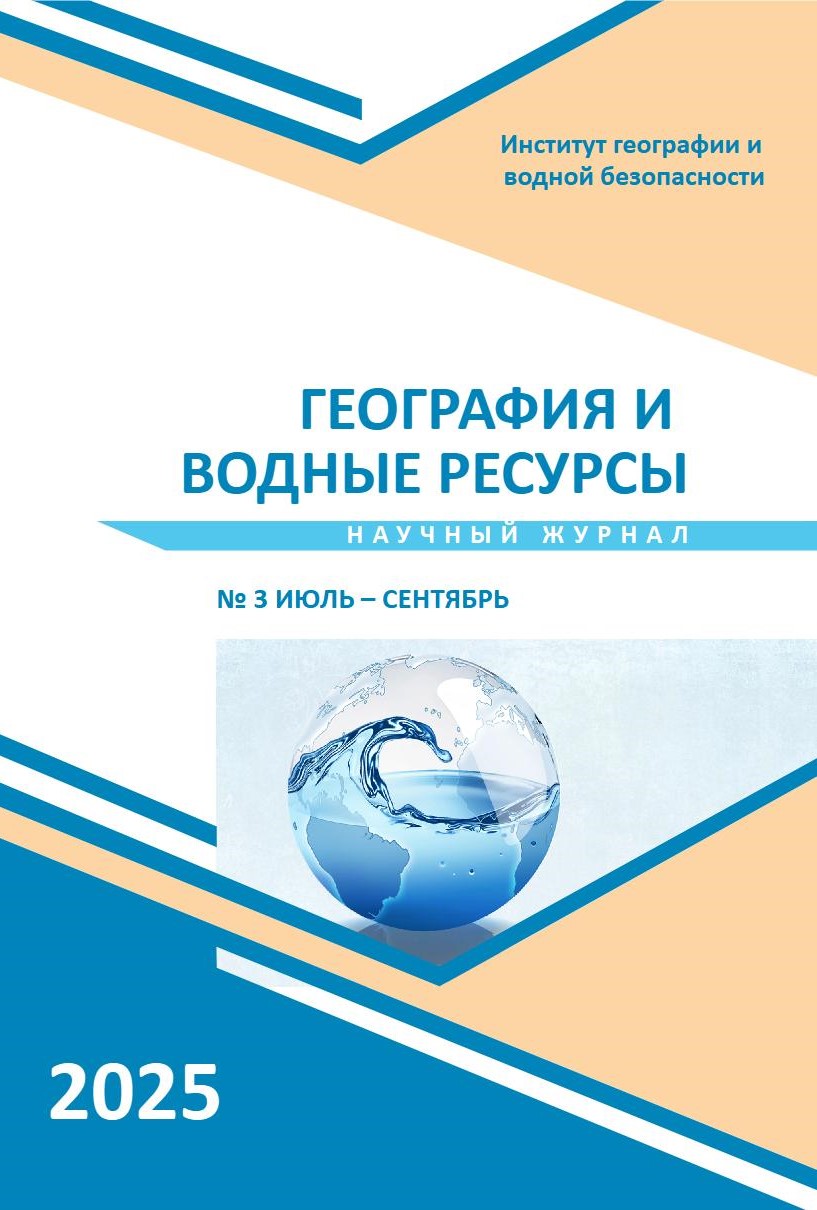ГИДРОГЕОХИМИЧЕСКИЙ СТОК ЦЕНТРАЛЬНОГО КАЗАХСТАНА И ЕГО РОЛЬ В РАЗВИТИИ ЭКЗОГЕННЫХ ПРОЦЕССОВ
Main Article Content
Аннотация
Подземные воды являются основным агентом геохимических обменов между гидросферой и литосферой. Для количественной оценки гидрогеохимического стока выделены 14 районов, относящихся к бассейнам четырех крупных внутренних водоемов, определена величина химического выноса подземными и поверхностными водами, а также привнос солей атмосферными осадками. На территории исследований в связи с ограниченным распространением поверхностного стока подземные воды являются основным механизмом в перераспределении вещества в земной коре. Наряду с процессом движения гравитационных вод, заключенных в горных породах верхней части земной коры от областей питания к местам дренирования, происходит миграция химических элементов, поступающих в подземную воду в результате различных физико-химических и биологических процессов, происходящих в системе «горная порода-вода».
Article Details
Библиографические ссылки
The United Nations World Water Development Report 2022: Groundwater: Making the invisible visible. UNESCO, Paris.
Non-renewable groundwater resources. A guidebook on socially-sustainable management for water-policy makers. IHP-VI, Series on Groundwater № 10. UNESCO. 2006. – 104 с.
Zektser, I. S., Everett L. G. (eds), 2004. Groundwater resources of the world and their use. UNESCO, IHP-VI, Series on Groundwater No 6, Paris, UNESCO. – 346 с.
Margat, J., J. van der Gun. Groundwater around the World. CRC Press/Balkema. International Standard Book Number – 13: 978-0-203-77214-0 (eBook – PDF). 2013. – 372 р.
Basharat, U., Zhang W., Abbasi A., Mahroof S., Han C., Khan S. H., Li S. Integrated assessment of groundwater hydrogeochemistry and quality using multivariate statistical analysis, self-organizing maps, and water quality indices in District Bagh, AJK, Pakistan. Ecotoxicol. Environ. Saf. 301, 2025. https://doi.org/10.1016/j.ecoenv.2025.118515
Основы гидрогеологии. Гидрогеохимия / С.Л. Шварцев, Е.В. Пинеккер, А.И. Перельман и др. Новосибирск, 1982. – 284 с.
Зверев В. П. Роль подземных вод в миграции химических элементов. М.: Недра, 1982. – 184 с.
Перельман А. И. Геохимия элементов в зоне гипергенеза. М.: Недра, 1972. – 298 с.
Пинеккер Е. В. Проблемы региональной гидрогеохимии. Закономерности распространения и формирования подземных вод, М.: Недра, 1977. – 196 с.
Шварцев С. Л. Гидрогеохимия зоны гипергенеза. М.: Недра, 1978. – 287 с.
Åberg A. K., Korkka-Niemi K., Åberg S. C., Rautio A. Application of 3D hydrogeochemistry and particle tracking in detecting groundwater flow patterns within an aapa mire–outwash plain system in a boreal environment at a mining development site. Applied Geochemistry, Volume 186, 2025. https://doi.org/10.1016/j.apgeochem.2025.106360.
Рациональное использование и охрана подземных вод Республики Казахстан в условиях климатических и антропогенных изменений / под.ред. Абсаметова М.К. – Алматы, 2020. – 280 с.
Атлас гидрогеологических карт Республики Казахстан. Ин-т гидрогеологии и геоэкологии им. У.М. Ахмедсафина. – Алматы, 2022. – 83 с.
UNESCO, CGMW, IAH, IAEA & BGR, 2008. Groundwater Resources of the World, 1: 25 M (WHYMAP). UNESCO & BGR, Paris, Hannover.
IGRAC, 2009. Map of Global Groundwater Regions (revised 29 April 2009, after the original version of 2004).
Абсаметов М. К. Геохимия подземных вод Балхашского сегмента земной коры Центрального Казахстана. Алматы: НИЦ «Ғылым», 2002. – 252 с.
Mischke S., Zhang CJ, Plessen B. Lake Balkhash (Kazakhstan): Recent human impact and natural variability in the last 2900 years. J Great Lakes Res 46:267–276/, 2020. https://doi.org/10.1016/j.jglr.2020.01.008
Zhang A., Wilson D., Ptacek C.J., Blowes D.W. Reactive transport modelling of tailings hydrogeochemistry under a composite cover. J. Contam. Hydrol., 261, 2024. https://doi.org/10.1016/j.jconhyd.2023.104290
Burri, E.; Petitta, M. Runoff drainage, groundwater exploitation and irrigation with underground channels in Cappadocia: Meskendir Valley case-study. J. Cult. Herit. 2005, 6, 191–197.
Chen J., Fan P., Zhang F., Tan T., Fang N., Wu Z., Li Zh., Liu Y. Distribution mechanisms of soil surface erosion and underground leakage in karst areas of China: A systematic, quantitative review. CATENA, Volume 246, 2024. https://doi.org/10.1016/j.catena.2024.108466.
Зекцер И. С., Джамалов Р. Г., Месхетели А. В. Подземный водообмен суши и моря. Л.: Гидрометеоиздат, 1984. – 207 с.

